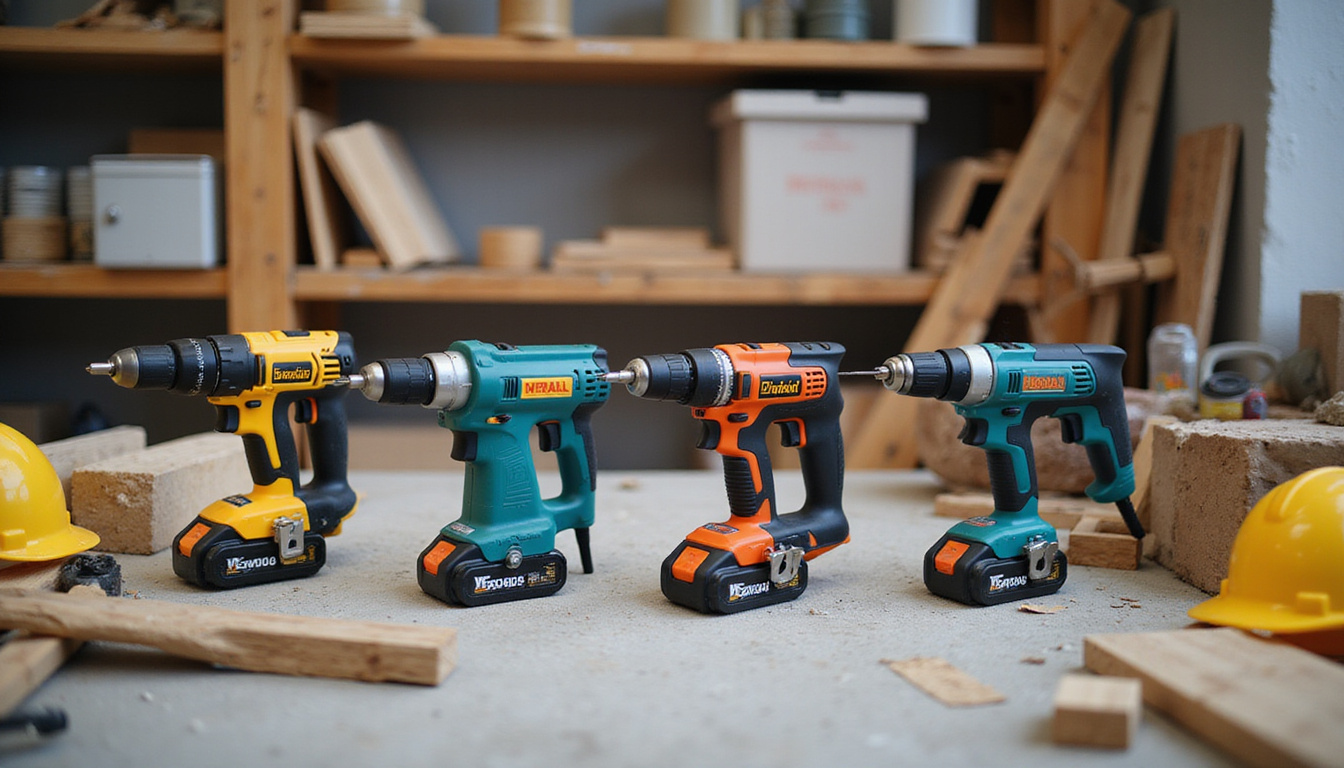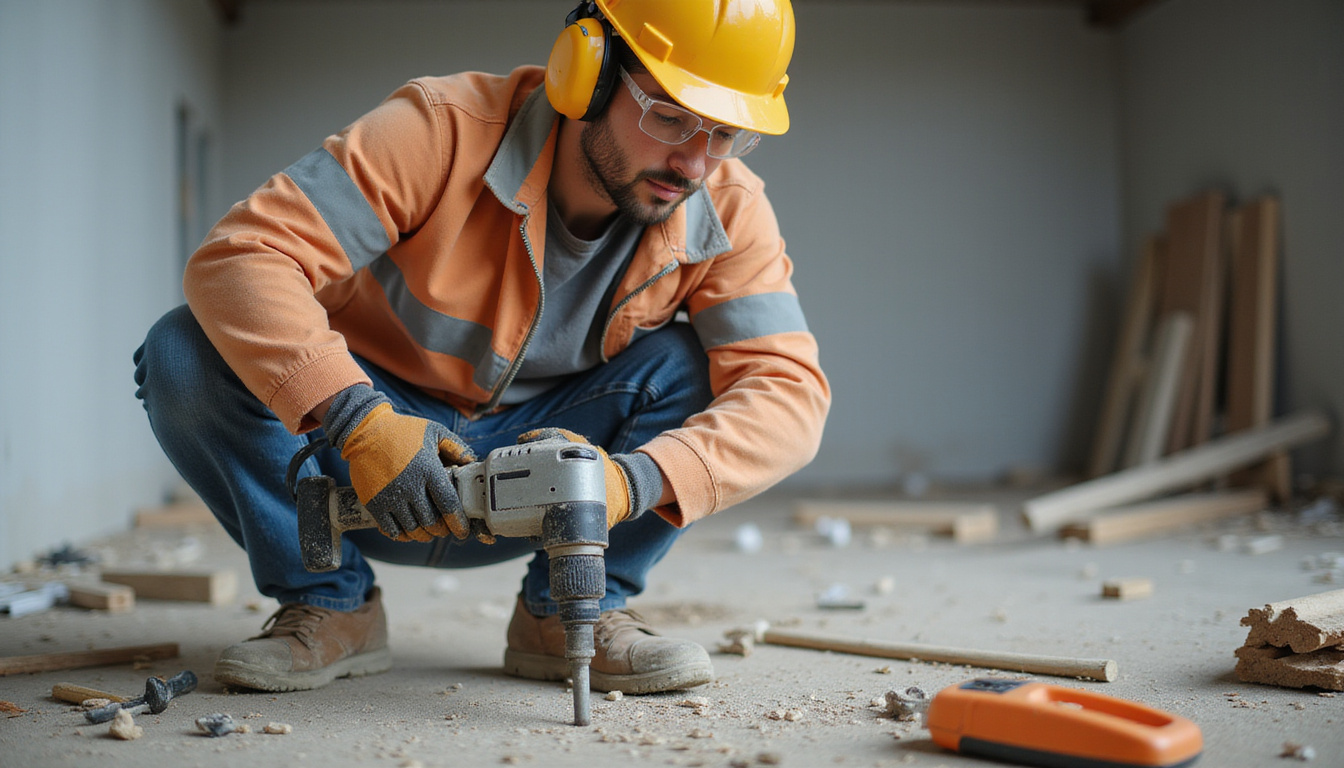Power Up Your Projects: The Ultimate Guide to Choosing the Best Hammer Drill

Ever found yourself struggling to drill through tough materials like concrete or masonry? If so, it's time to power up your projects with the right hammer drill! Hammer drills are vital tools in any DIY enthusiast or professional’s toolkit, designed to make those challenging tasks a breeze. In this ultimate guide, we’ll dive into everything you need to know about hammer drills, from types and features to safety tips and top brands, ensuring you find the perfect tool for your projects. So, let’s get started and unleash the full potential of your hammer drill!

Key Takeaways
- Hammer drills are essential tools for drilling into hard materials like concrete and masonry.
- Selecting the right type of hammer drill depends on the specific requirements of your project.
- Key features such as power, speed, and weight should influence your hammer drill choice.
- Safety precautions are vital when using hammer drills to prevent accidents and injuries.
- Regular maintenance extends the lifespan of your hammer drill and ensures optimal performance.
Introduction to Hammer Drills: What You Need to Know
When it comes to tackling tough jobs around the house or on a construction site, a hammer drill might just be your best friend! Ever found yourself struggling to drill into masonry or concrete? A hammer drill is designed specifically for those challenging materials, combining rotary drilling motion with a hammering action that helps break through tough surfaces. Understanding how a hammer drill works can elevate your DIY projects, ensuring that you complete them more efficiently and effectively. This essential tool not only saves you time but also makes challenging tasks feel almost effortless. So, whether you’re a seasoned pro or a DIY newcomer, it's important to know the ins and outs of hammer drills to maximize your work efforts.
Types of Hammer Drills: Choosing the Right One for Your Project
When embarking on a project that requires drilling through tough materials like concrete or masonry, selecting the appropriate hammer drill is crucial. Hammer drills come in various types, each designed for specific tasks, making it essential to understand their features before making a choice. Corded Hammer Drills are ideal for heavy-duty work, providing a consistent power source that makes them suitable for extended tasks. On the other hand, Cordless Hammer Drills offer greater mobility and convenience, making them a favorite for smaller projects or in areas without accessible power outlets. Additionally, Rotary Hammer Drills are designed for the toughest jobs, capable of handling the hardest materials with ease due to their powerful mechanism. Lastly, there are Combination Hammer Drills, which offer the flexibility of using them as a regular drill or a hammer drill, making them highly versatile for various applications. By assessing your project needs, you can select the hammer drill that best aligns with your requirements, ensuring efficiency and effectiveness in your work.
'The right tool for the right job is a key principle of craftsmanship.' - Unknown
Key Features to Consider When Buying a Hammer Drill
When it comes to choosing the right hammer drill for your needs, there are several key features to consider that can make a significant difference in performance and usability. First, look at the power of the motor, typically measured in amps or volts, as this determines how effectively the drill can handle tough materials like concrete or masonry. Next, consider the drill's impact rate, which indicates how many blows per minute the hammer drill can deliver; a higher rate is essential for fast drilling in hard materials. Additionally, check for variable speed settings, which provide greater control for different tasks, allowing for both precision and power as needed. The weight and ergonomics of the hammer drill are also crucial—lighter models can reduce user fatigue, while a comfortable grip enhances overall handling. Lastly, don’t forget to look for additional features such as a depth stop for precision drilling and a lock-on button for continuous use, which can enhance your drilling experience.

Safety Tips for Using Hammer Drills Effectively
Using a hammer drill can make your DIY projects more efficient, but it's crucial to prioritize safety to avoid accidents. Here are some essential safety tips for using a hammer drill effectively:
1. Wear Proper Safety Gear: Always use safety goggles to protect your eyes from dust and debris. Ear protection is also recommended, as hammer drills can be quite loud.
2. Check Your Workspace: Before starting, ensure that your work area is tidy and free of obstructions. Be mindful of any hidden pipes or electrical wiring in the walls where you plan to drill.
3. Secure the Material: Always secure the material you are drilling into with clamps or a vice to prevent it from moving, which could cause loss of control of the drill.
4. Maintain a Firm Grip: Hold the hammer drill with both hands and keep your fingers away from the trigger until you are ready to start. This control helps you manage the powerful vibrations that can occur when drilling through tough materials.
5. Choose the Right Setting: Depending on your project, adjust the drill settings appropriately. For masonry drilling, use the hammer setting, while a standard drill mode works best for softer materials. Following these tips can ensure a safer and more efficient hammer drilling experience.
Top Brands and Models of Hammer Drills Reviewed
When it comes to selecting the best hammer drill for your DIY projects or professional jobs, it’s crucial to know which brands and models stand out. Hammer drills are versatile tools, perfect for drilling into masonry, concrete, and other tough surfaces. Here are some of the top brands and models to consider:
1. Bosch 11255VSR 1-Inch Hammer Drill: Known for its durability and performance, this model features a powerful
8.5 Amp motor that provides an excellent impact energy of
2.7 ft-lbs. Perfect for heavy-duty use, it's lightweight and equipped with a two-speed transmission for better control.
2. Makita XPH07Z 18V LXT: This cordless hammer drill is a favorite among professionals for its balance of portability and power. With a brushless motor and an impressive torque of 1,090 in-lbs, it performs exceptionally well in both drilling and hammer drilling applications.
3. DeWalt DCD996B 20V MAX: This powerhouse offers a three-speed high-performance motor for efficient drilling in various materials. The LED light and compact design make it easy to work in tight spaces, while the adjustable clutch allows for heightened versatility.
4. Milwaukee 2707-20 M18 Fuel: Renowned for its superior performance, this hammer drill features a POWERSTATE brushless motor that delivers up to 1,800 in-lbs of torque. With REDLINK PLUS intelligence for enhanced performance and protection against overload, it’s ideal for tough tasks.
5. Hitachi DH36DMA: A robust model with a 36V battery system, this hammer drill boasts impressive flexibility and battery life. Its ergonomic design reduces user fatigue, making it perfect for extended work sessions.
These hammer drills not only stand out due to their precision and power but also cater to different user preferences, making them some of the best choices in the market today.
Frequently Asked Questions
What is a hammer drill and how does it work?
A hammer drill is a power tool that combines rotary drilling and hammering actions to penetrate hard materials like concrete and masonry. It has a mechanism that produces rapid, pulsing blows while the drill bit rotates, allowing it to break through tough surfaces more efficiently than a standard drill.
What are the different types of hammer drills available?
There are primarily two types of hammer drills: corded and cordless. Corded hammer drills typically offer more power and are suitable for heavy-duty tasks, while cordless hammer drills provide greater portability and convenience for smaller projects.
What features should I look for when purchasing a hammer drill?
Key features to consider include the drill's power rating (measured in volts for cordless types), impact rate (measured in beats per minute), weight, battery life (for cordless models), and the availability of various modes (such as drilling, hammering, and chiseling). Also, check for additional features like adjustable speed settings and ergonomic designs.
Are there any safety tips I should follow while using a hammer drill?
Yes, always wear safety goggles and hearing protection to safeguard your eyes and ears. Secure your workpiece, maintain a firm grip on the tool, and avoid loose clothing or jewelry that could get caught in the drill. It's also crucial to check for any hidden electrical wires or plumbing before drilling into walls.
How can I maintain my hammer drill for longevity?
To maintain your hammer drill, ensure it is cleaned after each use, especially the drill bits and chuck. Regularly check and replace the brushes if it's a corded model, and inspect the batteries for cordless drills. Store it in a dry place away from extreme temperatures to prevent damage.

